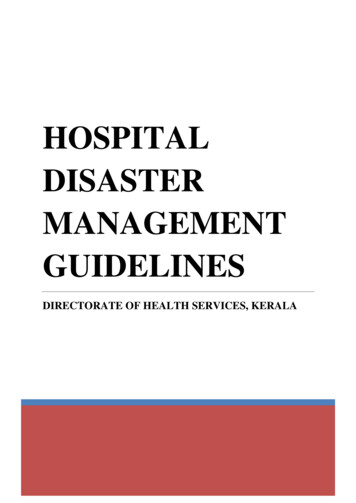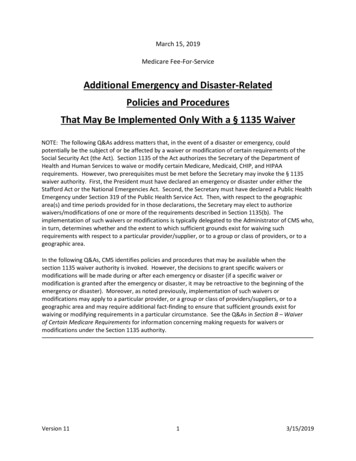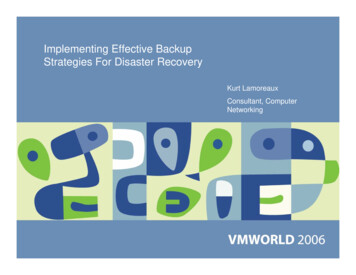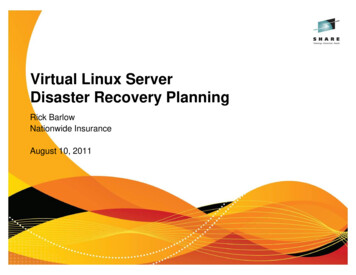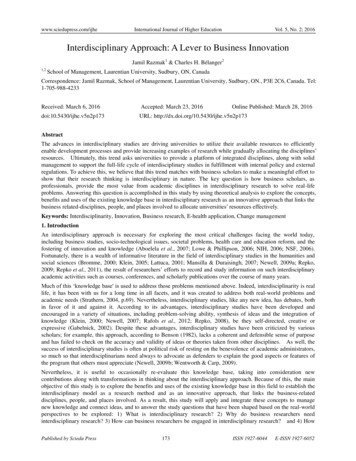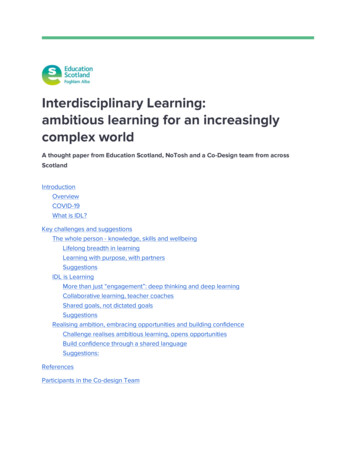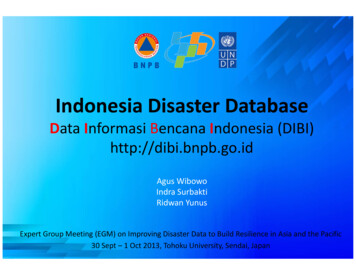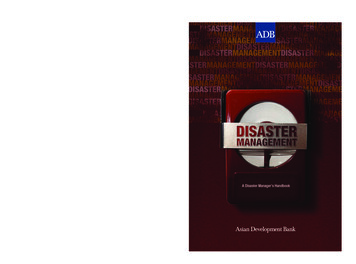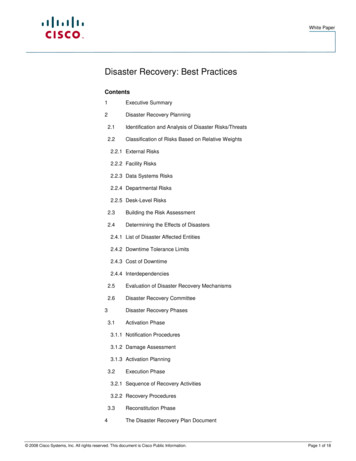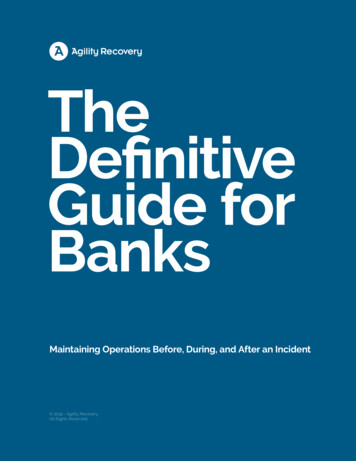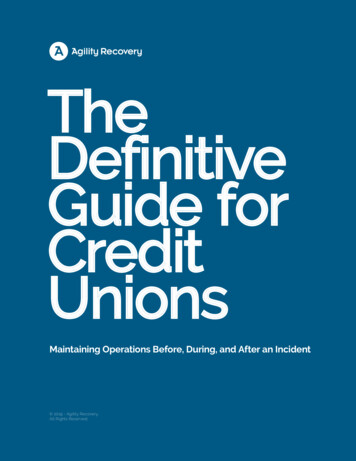
Transcription
INTERDISCIPLINARY GRADUATE PROGRAM IN DISASTER SCIENCE &MANAGEMENT (DISA)Program Policy StatementRevised September 26, 2012, April 21, 2015, September 15, 2016, December 27, 2020,October 4, 2021TABLE OF CONTENTS1.0 Program History . 31.1 Mission Statement . 31.2 Origin of the Program . 31.3 Description of the Planning Process . 31.4 Current Status . 41.5 Degrees Offered . 41.6 Program Administration . 42.0 Admission . 42.1 University Policy on Admission . 42.2 University Admission Procedures . 42.3 Expected Minimum Requirements for Admission into the Disaster Science &Management Program . 62.4 Admission Application Processing . 62.5 Admission Status . 73.0 Degree Requirements for the Master of Science in Disaster Science & Management . 73.1 Overview . 73.2 Course Requirements Non-Thesis Option. 73.3 Course Requirement Thesis Option . 83.4 Planned Program of Study and Revisions . 93.5 Regulations Governing Theses . 103.6 Articulation between Master’s and Doctoral Degrees . 114.0 Degree Requirements for the Doctor of Philosophy in Disaster Science & Management . 134.1 Course Requirements . 134.2 Planned Program of Study and Revisions . 154.3 Regulations Governing Dissertations . 174.4 Residency Requirements . 194.5 University Requirements and Deadlines for Admission to Doctoral Candidacy 194.6 Registration Requirements Prior to Doctoral Candidacy . 194.7 Registration Requirements after Admission to Candidacy . 205.0 Assessment . 205.1 Purpose and Goals . 205.2 Measurements of Learning Objectives . 216.0 General Information Relevant to Both Master’s and Doctoral Degree Candidates. 216.1 Financial Assistance . 211
6.2 Graduate Course Numbering System . 216.3 Application for Advanced Degree . 216.4 Time Limits for Completion of Degree Requirements . 226.5 Extension of the Time Limit . 226.6 Sustaining Status for Candidates Pursuing Thesis/Dissertation Degree Option 226.7 Transfer Credit Earned as Continuing Edu. Student at University of Delaware 226.8 Transfer Credit from Another Institution . 226.9 Transfer Credit from Undergraduate Division of University of Delaware . 236.10 Credit for “Special Problem” Course Taken as a Graduate Student . 236.11 Expiration of Credit . 237.0 Program Administrative Structure . 232
Program HistoryThe increased frequency and cost of natural, technological and human-induced disasters hasdemonstrated the importance of social systems to prepare for, respond to, and restore functionsafter emergent disaster events. The many dimensions of these objectives point to an urgent needfor well-rounded, interdisciplinary professionals and scholars in this field.1.1 Mission StatementThe Disaster Science & Management (DISA) program is an interdisciplinary course of study thatteaches the theories, research methodologies, and policies informing efforts focused onemergency preparedness, mitigation, management, and response, and recovery.The program builds on the unique strengths and international reputation of the DisasterResearch Center (DRC) and related programs and research at the University of Delaware.The mission of the program is to educate and promote interdisciplinary scholarship in DisasterScience & Management. This program offers a thesis and non-thesis Master of Science and aPhD degree and includes a core curriculum, electives, internships and where applicable, research.The program involves faculty from all Colleges at the University of Delaware and fosterssustained partnerships with federal, state, and regional agencies, such as the Federal EmergencyManagement Agency (FEMA) and Delaware Emergency Management Agency (DEMA) tosupport student research and internships. The program also creates and fosters opportunities tosecure new grants and fellowships for Disaster Science & Management.1.2 Origin of the ProgramThe Disaster Research Center at the University of Delaware is a leading center in the study of thesocial science of disasters. Originally grounded in sociology, DRC’s research becameincreasingly multi- and inter-disciplinary. At the same time, faculty in other units on campuswere also conducting related research, and overall there was increasing awareness of theimportance of the both short- and long-term impacts of disasters. This graduate program in“Disaster Science & Management” complemented ongoing and new research, leveraged existingprograms, and was both timely and relevant.In the summer of 2006, Provost Rich established the Committee for a Graduate Program inDisaster Science & Management. The purpose of the committee was to explore program options,building on the existing programs and research in the Disaster Research Center (DRC).1.3 Description of the Planning ProcessThe proposal was formed by the Committee for a Graduate Program in Disaster Science &Management, a group of thirteen faculty representing all Colleges at the University of Delaware.The committee was chaired by Sue McNeil (Civil and Environmental Engineering and Directorof the Disaster Research Center) and the members were: Burt Abrams (Economics), BenignoAguirre (Sociology and DRC), James Corbett (Marine and Earth Studies), Tracy DeLiberty(Geography), Russell Dynes (DRC), Debra Hess Norris (Art Conservation), Joanne Nigg(Sociology and DRC), Havidan Rodriguez (Provost’s Office and DRC), Rick Sylves (PoliticalScience), Jeff Raffel (CHEP), Eric Rise (Criminal Justice), Tom Sims (Agriculture and NaturalResources), and Jim Richards (Health Sciences). The committee met regularly overnine monthsto develop an outline for a new program. Meetings included an analysis of strengths,weaknesses, opportunities, and threats (SWOT) related to disaster studies and a careful review ofrelevant existing courses and alternate administrative structures. Committee members examinedexisting graduate programs in disaster studies nationally, met with potential employers and3
prospective students and conducted a full-day work session to develop the draft program policystatement.The committee considered program structure, opportunities for recruiting students, otherrelated programs and the potential employers of graduates.Draft copies of the proposal were circulated to interested faculty, administrators, and externalexperts and two lunch-time meetings were held with faculty and administrators from possiblecooperating departments and centers in April 2007. Comments and suggestions were gatheredand incorporated into the final proposal. The committee also met with graduate students at theDisaster Research Center, the 2007 NSF REU at DRC, the Sociology and Criminal Justicefaculty, and the School of Public Policy and Administration faculty. The committee alsopresented a poster at the Annual Natural Hazards Workshop in Boulder Colorado.The MS and PhD programs in Biomechanics and Movement Science served as aninterdepartmental prototype. This program placedd emphasis on the plan of study, and selectingan advisor at the application stage. TheThe committee also placed emphasis on the plan of studyand the need to have an advisor to be admitted to the program.1.4 Current StatusThe program was approved in April, 2010. The first cohort of students were admitted for Fall2010. Both the MS and PhD programs conducted internal reviews and submitted proposals forpermanent status in 2016. The Faculty senate voted to award the degree programs permanentstatus in the spring of 2017.1.5 Degrees OfferedThe degrees awarded to those who complete this program are either a Master of Science inDisaster Science & Management (both thesis and non-thesis options), or a Doctor of Philosophyin Disaster Science & Management.1.6 Program AdministrationThe program is administered by the Biden School of Public Policy and Administration inconjunction with the Interdisciplinary Disaster Science & Management Program Committee andits Program Director.2Admission2.1 University Policy on AdmissionAdmission to the graduate program is competitive. Those who meet stated minimumrequirements are not guaranteed admission, nor are those who fail to meet all of thoserequirements necessarily precluded from admission if they offer appropriate strengths.2.2 University Admission ProceduresApplicants must submit all of the following items directly to the Graduate Admissions using theonline admissions process before admission can be considered:1. A completed application must be submitted no later than December 15 for the DISA PhDprogram for fall semester. For the MS program: January 15 is the priority deadline fordepartmental funding and August 1 is the final deadline for fall semester. Applicationsare not accepted for spring semester.4
2. A 75 nonrefundable application fee must be submitted with the application. Credit cardpayment is accepted with the online application. Checks must be made payable to theUniversity of Delaware. Applications received without the application fee will not beprocessed. Foreign students must use a check drawn on a U.S. bank or an InternationalPostal Money Order.3. Applicants must submit essays to specific questions asked on the application; a statementof professional goals and objectives; and a scholarly writing sample.4. Applicants must submit at least three letters of recommendation. All letters ofrecommendation should be submitted through the online application process to GraduateAdmissions.5. Transcripts from all U.S. colleges attended must be included with the online application.The transcripts may be unofficial but official transcripts will be required onmatriculation.6. Transcripts of all non-U.S. based college records are required. The transcript must list allclasses taken and grades earned. If the transcript does not state that the degree has beenawarded, send a degree certificate that states that the degree has been awarded. If thedegree has not been awarded or the degree certificate has not been issued, evidence of theawarded degree must be provided prior to the first day of classes in the term ofadmission. For institutions that issue documents only in English, send the Englishtranscripts. For institutions that issue documents both in English and a foreign language,send both the English language and the foreign language transcripts. For institutions thatissue documents only in a foreign language, send the foreign language transcript and atranslation in English. The transcripts may be unofficial but official transcripts, andcertified translations will be required on matriculation.7. International student applicants must demonstrate a satisfactory level of proficiency inthe English language if English is not the first language. The Test of English as a ForeignLanguage (TOEFL) is offered by the Educational Testing Service in test centersthroughout the world. The DISA program has adopted the minimum scores adopted byGraduate Admissions at the University of Delaware. In addition, the department mayelect to require that the applicant provide a score from the TSE (Test of Spoken English).TOEFL scores and TSE/SPEAK scores more than two years old cannot be validated orconsidered official.International students must be offered admission to the University and provide evidenceof adequate financial resources before a student visa will be issued. The University hasbeen authorized under federal law to enroll nonimmigrant alien students. The Universityhas more than 1000 international graduate students enrolled from more than 96 countries.International students are required to purchase the University-sponsored insurance plan orits equivalent.All first-time international students are required to attend the Orientation Day for newinternational students, which takes place on the Friday before classes begin.5
8. It is a Delaware State Board of Health regulation and a University of Delaware mandatethat all graduate students with a birth date after January 1, 1957, be immunized formeasles, mumps and rubella (MMR). Also, students may be required to provide evidenceof PPD (Mantoux) Tuberculosis Screening Test within 6 months prior to beginningclasses. Students who are admitted beginning January 2002 are required to show proof ofvaccination against meningococcal disease unless granted a waiver. Students should referto and complete the Student Health Service Immunization Documentation form uponadmission.9. A supplemental application form indicating interest in financial support through researchcenters.2.3 Expected Minimum Requirements for Admission into the Disaster Science &Management ProgramAdmissions decisions are made by the Program Committee or a designated subcommittee of theDisaster Science & Management Program. Students are admitted to the program based onenrollment availability and their ability to meet the following minimum recommended entrancerequirements.Applicants to the MS program must have: Baccalaureate degree from an accredited college or university. An undergraduate GPA of 3.0 or higher Written statement of goals and objectives (the personal statement) that clearly identifiesthe applicant’s research and curriculum interests and explains how admission to theprogram will facilitate his or her professional objectives. A scholarly writing sample that represents the applicant’s best work.Applicants to the PhD Program must have: MS or equivalent degree from an accredited college or university A graduate GPA of 3.5 or higher. Written statement of goals and objectives (the personal statement) that clearly identifiesthe applicant’s research and curriculum interests and explains how admission to theprogram will facilitate his or her professional objectives. A scholarly writing sample that represents the applicant’s best work.All students are also expected to demonstrate competence in oral and written communication.Knowledge of mathematics and statistics is strongly encouraged. All admitted students musthave a willing academic advisor appointed by the DISA Program Comittee.2.4 Admission Application ProcessingThe admission process is completed as follows. First, completed applications consisting of theapplication form, undergraduate/graduate transcripts, letters of recommendations, resume,statement of purpose, written statement of goals and objectives, and scholarly writing sample arereviewed by the Disaster Science & Management Program Committee or a designatedsubcommittee. Pending a successful review of the initial application materials, the application iscirculated to all the Disaster Science & Management faculty in an effort to match the studentwith an advisor. Faculty members advise students whose background, goals and objectives arecompatible with their own research and funding. The Program Committee or a designated6
subcommittee arrives at an admission decision after reviewing the completed application. To beadmitted a student must have an advisor.The Program Committee or a designated subcommittee of the Disaster Science &Management Program will begin reviewing applications in January and may require a period oftwo to three months to process completed applications.2.5 Admission StatusStudents admitted to the Disaster Science & Management Program may be admitted into one ofthree categories:1. Regular. Regular status is offered to students who meet all of the established entrancerequirements, who have a record of high scholarship in their fields of specialization, andwho have the ability, interest, and maturity necessary for successful study at the graduatelevel in a degree program.2. Provisional. Provisional status is offered to students who are seeking admission to thedegree program but lack one or more of the specified prerequisites. All provisionalrequirements must be met within the deadline given before regular status can be granted.Students admitted with provisional status are generally not eligible for assistantships orfellowships. Students who file an application during the final year of undergraduate orcurrent graduate work and are unable to supply complete official transcripts showing theconferral of the degree will be admitted pending conferral of the degree if their recordsare otherwise satisfactory and complete.3. Visiting Student Scholars. Visiting scholar admission is offered to students who wish totransfer graduate credits to another institution. Visiting students must submit a letter fromtheir graduate dean or registrar certifying that they are graduate students in good standingat another institution. Such letters will be accepted in lieu of the transcripts and GREscores which are required of all other applicants. Visiting scholar status is generallylimited to a period of two years and is a non-degree status. If visiting students desire totransfer to regular status at the University of Delaware, they must meet the statedadmissions standards. Admission as a visiting student implies no commitment about lateradmission as a regular student or about transferability of courses from the student'soriginal institution.3Degree Requirements for the Master of Science in Disaster Science & Management.3.1 OverviewThe Disaster Science & Management Program offers a Non-Thesis and a Thesis Option. Each isdescribed below. Students enrolled in the DISA MS program must take the prescribed sequenceof courses outlined by the Graduate Program Committee at the time of admittance, or secureProgram Committee approval prior to any changes or substitutions3.2 Course Requirements Non-Thesis OptionThe Master of Science in Disaster Science & Management (Non-Thesis Option) requires 30credits including 24 credits of graduate level coursework, 2 semesters of seminar at 1 credit per7
semester, 1 credit of practicum, and a 3 credit internship. The 24 credits of coursework arespecified in the student’s plan of study and must include:Three Core Courses (9 credits): DISA 650 – Overview of Disaster Science & Management DISA 652 – Issues in Disaster Recovery DISA 670 – Issues in Disaster ResponseResearch Methods/Analysis Courses (3 credits): EDUC 665 – Elementary Statistics, or SPPA 808 – Qualitative Methods for Program Evaluation, or SOCI 605 – Data Collection and Analysis, or UAPP 691 – Quantitative Analysis in Public and Nonprofit Sector, or UAPP 702 – Research Methods in Urban and Public Policy, or EDUC 850 – Qualitative Research in Education, or EPID 605 – Methods in Epidemiology, or EPID 621 – Methods in Field Epidemiology, or EPID 622 – Disaster Epidemiology Methods, or GEOG 670 – Geographic Information Systems and Science, or other suitable research methods course.Public Policy and Organizational Decision Making (3 credits): UAPP 613 – Planning Theory and Urban Policy, or MAST 663 (or UAPP 663) – Decision Tools for Policy Analysis, or UAPP 707 – Public Policy Analysis, or a suitable related courseOther Requirements: Other disaster-oriented courses (9 credits) SPPA661 – Masters Level Professional Development (1 credit) Taken two semesters forcredit. DISA 857 – Practicum (1 credit)DISA 858 – Internship (3 credits) Completed in any semester (including summer andwinter sessions). This can take the form of a traditional internship, or other appliedexperience commensurate with the student’s interests and experience, and with approvalof internship coordinator. The 120-hour internship, however fulfilled, requires a report.Potential internship placements include DEMA, FEMA, other DHS Offices, UnitedNations, and USAID. Study abroad is also strongly encouraged.3.3 Course Requirement Thesis OptionThe Master of Science in Disaster Science & Management (Thesis Option) requires 33 creditsincluding 24 credits of graduate level coursework, 2 professional development courses (1 creditper semester),1 credit of practicum, and 6 credits of thesis. The 24 credits of coursework arespecified in the8
Three Core Courses (9 credits): DISA 650 – Overview of Disaster Science & Management DISA 652 – Issues in Disaster Recovery DISA 670 – Issues in Disaster ResponseResearch Methods/Analysis Courses (3 credits): EDUC 665 – Elementary Statistics, or SPPA 808 – Qualitative Methods for Program Evaluation, or UAPP 691 – Quantitative Analysis in Public and Nonprofit Sector, or UAPP 702 – Research Methods in Urban and Public Policy, or EDUC 850 – Qualitative Research in Education, or EPID 605 – Methods in Epidemiology, or EPID 621 – Methods in Field Epidemiology, or EPID 622 – Disaster Epidemiology Methods, or GEOG 670 – Geographic Information Systems and Science, SOCI 605 – Data Collection and Analysis, or or other suitable research methods course.Public Policy and Organizational Decision Making (3 credits): MAST 663 (or UAPP 663) – Decision Tools for Policy Analysis, or UAPP 707 – Public Policy Analysis, UAPP 613 – Planning Theory and Urban Policy or other suitable related courseOther Requirements: Other disaster-oriented courses (9 credits) SPPA661 – Masters Level Professional Development (1 credit) Taken two semesters forcredit. DISA 857 Practicum (1 credit) Thesis (6 credits) Study abroad also strongly encouraged3.4 Planned Program of Study and RevisionsStudents are required to work with their advisor during their first semester of study and develop aplan of study. The plan of study must first be approved by the advisor and then by the ProgramCommittee or the designated subcommittee by the end of the first semester of study for the MS.Students may need to alter approved programs of study once they have entered the program dueto reasons that can include scheduling conflicts or the creation of new courses directly related tothe student's goals. Students who wish to make changes to their program of study should firstobtain permission from their advisor. The student must then make a written request to theProgram Committee or the designated subcommittee for a revision to the program of study. Thestudent may submit a request, to the Program Director, for a change of advisers (for example iftheir research better aligns with another Disaster Science & Management faculty member or ifanother Disaster Science & Management faculty member will be serving as a thesis committeechair).9
3.5 Regulations Governing Theses1. Establishment of Thesis Committee: The student and his/her advisor will create a thesiscommittee at the time the student begins to develop the thesis proposal. The thesiscommittee shall include three University faculty from within the Disaster Science &Management Program, and may have no more than six members. The thesis chair mustbe a member of the Disaster Science & Management faculty and at least one of theDisaster Science & Management committee members must be from a differentdepartment than that of the advisor. With the approval of the Disaster Science &Management Program Committee or a designated subcommittee, a professional staffmember who holds a secondary faculty appointment within an academic department mayserve as a committee member. Faculty who have retired or resigned from the Universitymay maintain committee membership or continue to chair committees of students whosework began under their direction prior to their retirement or departure from theUniversity. Disaster Science & Management faculty who do not have regular facultystatus may co-chair the thesis committee provided that the other co-chair meets thedefinition for regular faculty status. It is the responsibility of the thesis chair to replacemembers who withdraw from the committee during the thesis process.2. Defense of the Thesis Proposal: The format of the thesis must adhere to guidelinesspecified in the University's Thesis and Dissertation Manual. The manual is availableelectronically on the Web at pdf . Acopy of the thesis proposal must be delivered to the members of the thesis committee atleast two weeks in advance of the proposal defense. Prior to the presentation, proposalsthat involve the use of human subjects must receive approval from the UniversityInstitutional Review Board (IRB). Details for creating consent forms and submittingstudies for review by the IRB can be obtained from the Office of Research.The thesis proposal defense will be scheduled only after a majority of members of thethesis committee have determined that a defense is appropriate. It is expected that theproposal shall be presented early in the third semester. The thesis proposal defense willbe open to the public, and invitations will be sent to all Disaster Science & Managementfaculty and students at least one week prior to the date of the defense. The candidate willpresent a summary of the proposed research, and will then field questions from thecommittee, attending faculty, and invited guests. After all questions have been fielded,the thesis committee will meet to decide whether the proposal is accepted, rejected, oraccepted with stipulations. Results of the meeting will then be presented to the student.The student receives a passing grade if the majority of the committee members vote infavor of a passing grade.Thesis committee members will sign the final copy of the approved proposal. A signedcopy of the approved thesis proposal will be forwarded to the program director. Studentswho fail the thesis proposal defense will receive one additional opportunity to repeat theprocess and defend a new or modified thesis proposal.10
3. Defense of the Thesis: The format of the thesis must adhere to the University's Thesisand Dissertation Manual. This document is available on the University's website. A copyof the thesis must be delivered to each of the members of the thesis committee at leasttwo weeks prior to the thesis defense. The thesis defense will be scheduled only after thechair of the thesis committee has determined that a defense is appropriate.The thesis defense will be open to the public, and invitations will be sent to all DisasterScience & Management faculty and students at least one week prior to the defense. Thecandidate will present a summary of the completed research, and will then field questionsfrom the committee, attending faculty, and invited guests. After all questions have beenfielded, the thesis committee will meet privately to decide whether the thesis is accepted,rejected, or accepted pending revisions. Results of the meeting will then be presented tothe student. The student receives a passing grade if the majority of the committeemembers vote in favor of a passing grade.Master’s theses are due to the Graduate College approximately six weeks prior to the dateof degree conferral. Actual dates are posted on the tion/4. Processing the Final Document: Instructions for preparing the final document areposted on the website of the Graduate tion/3.6 Articulation between Master’s and Doctoral DegreesThe non-thesis option Master’s degree is considered to be a terminal degree in Disaster Science& Management at the University of Delaware. The thesis option Master’s degree in DisasterScience & Management is also considered terminal unless the s
The Disaster Science & Management (DISA) program is an interdisciplinary course of study that teaches the theories, research methodologies, and policies informing efforts focused on emergency preparedness, mitigation, management, and response, and recovery. The program builds on the unique strengths and international reputation of the Disaster
